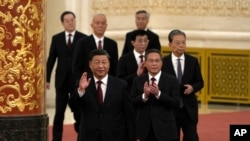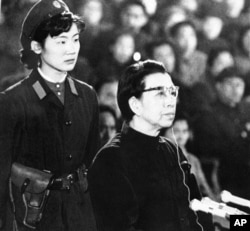As China’s biggest political meeting of the year wrapped up Monday, analysts highlighted how power in the world’s second-largest economy continues to consolidate under leader Xi Jinping. Some were also discussing two other prominent politicians — Premier Li Qiang and Xi’s Chief of Staff, Cai Qi — and the role they play in Xi’s China.
Li and Cai are members of the Chinese Communist Party’s top decision-making body, the Politburo Standing Committee. Li is ranked second on the PSC, and Cai is ranked fifth. Both are seen as Xi loyalists who were handpicked by China’s leader to serve in their current roles.
They also have ties with Xi that stretch back decades.
Cai worked with Xi in the 1980s when he was posted in China’s southern coastal province of Fujian. They later worked together in Zhejiang, where Xi rose to the post of provincial party secretary.
Li also worked with Xi in Zhejiang, where he held various posts, including party secretary of Shanghai, before rising to his current position as premier.
Some analysts say that during this year’s Two Sessions, the power of Li, who as premier oversees economic decision-making, was weakened, while the power of Cai, who is responsible for maintaining stability, is on the rise, given China’s growing emphasis on national security.
Hsin-hsien Wang, a distinguished professor at the Graduate Institute of East Asian Studies at National Chengchi University in Taipei, says one major focus of this year's meetings was a revision of the Organic Law of the State Council, China’s cabinet. The changes to the law — the first since 1982 — gave the party more executive control over the State Council.
"Li Qiang is responsible for the affairs of the State Council, including economy, society, industry and development, while Cai Qi is responsible for security and party affairs,”
Wang said. “This division of labor is becoming more and more clear, so some people overseas say it is the 'Gang of Three,' meaning Xi, Li Qiang and Cai Qi.”
China also abandoned a 30-year tradition during this year’s meetings when it canceled the premier’s press conference at the end of the meetings. Both moves, analysts say, downgrade the status of Li and the State Council he presides over.
In contrast, Cai is ranked fifth in China’s leadership chain but is the first in that position to become a top aid to the president since the time of China’s former revolutionary leader Mao Zedong. He has accompanied Xi on numerous foreign trips and in meetings with foreign leaders, including U.S. President Joe Biden last November.
Willy Lam, a senior fellow at The Jamestown Foundation in Hong Kong, says that since winning an unprecedented third five-year term in 2022, X has emphasized that the party leads everything, including the economic and financial fields.
Lam says Xi’s concentration of power even exceeds that of Mao.
"Even in Mao's era, when [he] wanted to keep all the power in his own hands, Mao still had to [delegate] part of the power, especially because Mao didn't know much about economics. So, he still [handed it over to] people like Chen Yun and Deng Xiaoping in the party who knew a little bit about economics."
Cai Shenkun, a U.S.-based independent social media commentator with 288,000 followers on X, formerly known as Twitter, agrees and calls Li and Cai nothing more than "minions who take orders in front of Xi."
But other analysts, such as Deng Yuwen, say both men still have their own interests and are highly competitive with each other. Deng, a political commentator and former deputy editor at the party journal Study Times, coined the phrase the “Gang of Three” to refer to the Xi-Li-Cai power circle.
The phrase is a reference to the “Gang of Four” that was led by Mao Zedong’s wife, Jiang Qing, during China’s tumultuous Cultural Revolution. Deng sees similarities between the political power dynamics of Xi, Li and Cai today and those of Mao, his wife and Lin Biao, another key leader at that time.
Lin Biao was one of Mao’s greatest supporters and at one time his designated successor, but he died in a mysterious plane crash in 1971 while allegedly fleeing China as a “traitor,” according to China’s Communist Party. Scholars point out the lack of evidence to support the party’s version of events and some believe he was fleeing from a possible purge.
Jiang Qing was a powerful player during China’s Cultural Revolution from the mid-1960s to mid-1970s, a movement that suppressed traditional Chinese culture and led to the persecution and deaths of millions. She was purged after Mao’s death in 1976 and imprisoned as a member of the “Gang of Four,” which was blamed for the extremism of the Maoist movement.
Deng says that Li and Cai take orders from Xi just like Lin and Jiang did from Mao. But unlike Lin Biao, whose influence over the military gave him a power base that was seen as a challenge to Mao, Li and Cai are “completely relying on Xi's hand. ... Therefore, in terms of their relationship with Xi, the two have no capital to dare to disobey Xi.”
Still, Deng says he believes Li is looking to be appointed as Xi's successor.
Chong Ja Ian, an associate professor of political sciences at the National University of Singapore, says Li and Cai must tread carefully so as not to show too much ambition or else they will not only arouse Xi's suspicion but also that of their peers. Chong says looking back on the communist party's history, whoever emerged too early as a possible successor was likely to have trouble.
"I think that in such an environment, it is difficult for them to pursue a certain position more formally,” Chong tells VOA. “If you do it too obviously, you will become a target."
National Chengchi University’s Wang says Xi’s succession is not yet an issue and may not be for years to come as he could always be reelected by his peers for an unprecedented fourth term in 2027.
China’s National People’s Congress in 2018 eliminated term limits for the president, which could allow the 70-year-old Xi to remain head of state for life.
Adrianna Zhang, Chuang Chih-wei contributed to this report.






